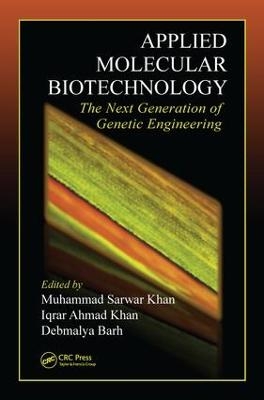
Applied Molecular Biotechnology
Crc Press Inc (Verlag)
978-1-4987-1481-5 (ISBN)
Highlights the latest omics-based tools and approaches used in modern biotechnology
Explains how various molecular biology technologies can be used to develop transgenic plants and how those plants can meet growing food and plant-derived product demands
Discusses chloroplast gene expression systems, mitochondrial omics, plant functional genomics, and whole-genome resequencing for crop improvement
Explores plant–microbe and plant–insect interactions affecting plant protection and productivity
Covers animal models, pharmacogenomics, human tissue banking, and the molecular diagnosis of diseases such as cervical cancer, obesity, and diabetes
Examines the molecular aspects of viral diseases, production of industrial commodities using viral biotechnology, and biotechnological uses of magnetic nanoparticles
Describes the use of biotechnology in the food, chemical, pharmaceutical, environmental conservation, and renewable energy sectors
Applied Molecular Biotechnology: The Next Generation of Genetic Engineering serves as a springboard for new discoveries in molecular biology and its applications. Thus, this book is an invaluable resource for students and researchers of molecular biotechnology.
Muhammad Sarwar Khan is a highly regarded molecular biologist who has made colossal contributions in the field of chloroplast genetic engineering, and is a pioneer in expressing oxygen-loving green fluorescent protein from jellyfish in chloroplasts—plant organelles with reduced environments. He also pioneered plastid transformation in rice and sugarcane, recalcitrant plant species. Dr. Khan has developed borer-resistant transgenic sugarcane plants with no toxin residues in the juice. Dr. Khan has supervised more than 100 students at the master’s and PhD levels. His current research involves edible-marker-carrying transgenics, cost-effective therapeutics, edible vaccines, and plantomics. Dr. Khan is presently director of the Center of Agricultural Biochemistry and Biotechnology at the University of Agriculture, Faisalabad, Pakistan. Iqrar Ahmad Khan has had a long career in education and agriculture. He has established or cofounded centers for the study of agriculture and food security throughout the world, released a potato variety (PARS-70), pioneered research on breeding seedless Kinnow, discovered new botanical varieties of wheat, and initiated a program to cure witches’-broom disease of lime in Oman. Dr. Khan is currently leading international projects to combat citrus greening disease and mango sudden death. He has been instrumental in helping UAF to achieve top ranks within the national, QS, and NTU systems. Debmalya Barh is a biotechnologist with decades of experience in integrative omics applied to translational research, and is the founder of the Institute of Integrative Omics and Applied Biotechnology, Nonakuri, India. Dr. Barh has authored more than 150 publications, edited several globally published omics-related reference books, and served as a reviewer for many prestigious international journals. As a result of his significant contributions in promoting research and development using unique strategies throughout the world, he was recognized by Who’s Who in the World in 2010 and entered in the Limca Book of Records—the Indian equivalent to the Guinness Book of World Records—in 2014.
Emerging Tools and Approaches to Biotechnology in the Omics Era. Plant Molecular Biology: Tools to Develop Transgenics. Plant Molecular Biotechnology: Applications of Transgenics. The Chloroplast Gene-Expression System. Molecular Biology of Mitochondria: Genome, Transcriptome, and Proteome. Plant Functional Genomics: Approaches and Applications. Whole-Genome Resequencing: Current Status and Future Prospects in Genomics-Assisted Crop Improvement. Molecular Biotechnology of Plant–Microbe–Insect Interactions. Biotechnology for Improved Crop Productivity and Quality. Overview of Methods to Unveil the Epigenetic Code. Animal Models and Biomedical Research. Variations in Our Genome: From Disease to Individualized Cure. Molecular Biotechnology for Diagnostics. Techniques for Cervical Cancer Screening and Diagnosis. Type 2 Diabetes Mellitus, Obesity, and Adipose Tissue Biology. Human Tissue Banking and Its Role in Biomedical Research. Microbial Biotechnology. Molecular Biology of Viruses: Disease Perspective. Viral Biotechnology: Production Perspective. Cell-Free Biosystems. Magnetic Nanoparticles with Multifunctional Water-Soluble Polymers for Bioapplications. Industrial Biotechnology: Its Applications in Food and Chemical Industries. Environmental Biotechnology: Approaches for Ecosystem Conservation. Marine Biotechnology: Focus on Anticancer Drugs. Engineering Genomes for Biofuels.
| Erscheint lt. Verlag | 14.6.2016 |
|---|---|
| Zusatzinfo | 35 Tables, black and white; 102 Illustrations, color |
| Verlagsort | Bosa Roca |
| Sprache | englisch |
| Maße | 178 x 254 mm |
| Gewicht | 1519 g |
| Themenwelt | Technik ► Umwelttechnik / Biotechnologie |
| Weitere Fachgebiete ► Land- / Forstwirtschaft / Fischerei | |
| ISBN-10 | 1-4987-1481-1 / 1498714811 |
| ISBN-13 | 978-1-4987-1481-5 / 9781498714815 |
| Zustand | Neuware |
| Haben Sie eine Frage zum Produkt? |
aus dem Bereich


